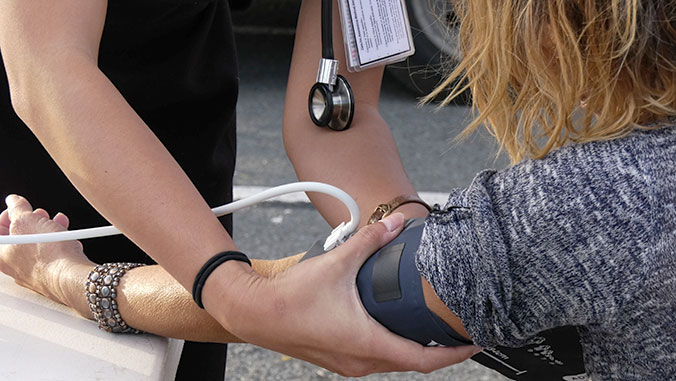
In its first two months of operation, the state’s first temporary quarantine and isolation center (TQIC) in Honolulu has provided a place for more than 50 homeless individuals who have COVID-19 symptoms to safely isolate or quarantine while they wait for test results.
Public, private and non-profit organizations and agencies formed the Behavioral Health and Homelessness Statewide Unified Response Group (BHHSURG) with the support of the University of Hawaiʻi at Mānoa, to break down silos and to ensure the community’s most vulnerable receive the care they need, especially during the COVID-19 pandemic.
The Hawaiʻi Department of Health has operated the TQIC with a number of community partners, including the Institute for Human Services; the Hawaiʻi Homeless Healthcare Hui; Local 5, the union that represents hospitality, healthcare and food service workers; and others. Collectively, the groups provided the necessary human resources support, including healthcare professionals, case managers and round-the-clock security for the center to open its doors in late March.
As a result, the center has been able to free up hospital space to improve care capacity, save on medical costs, and keep the community protected from potentially infected individuals.
According to a recent report prepared by the Department of Health and the UH Mānoa Office of Public Health Studies, data collected from clients at the center has also proven that such a facility has been effective in tackling a deeper, more pervasive challenge: the need for a behavioral health crisis stabilization center to take care of the health and social needs of homeless individuals, including those with substance use disorder.
“The population we serve is often marginalized but the services we provide are vitally important to the overall health and wellbeing of our entire community, and is a necessary component to safely reopening our state,” said Edward Mersereau, the Department of Health’s deputy director of behavioral health.
Mersereau said unsheltered individuals generally have other chronic, pre-existing health conditions such as undiagnosed or unmanaged diabetes and heart disease and have a disproportionately high rate of behavioral health conditions, including substance use disorders. This makes their care more complex, requiring an interdisciplinary approach.
“Through our work at UH on analytics, evaluation and the CARES Line, we are grateful for the opportunity for UH to partner with DOH on this proof of concept of a behavioral health crisis stabilization center which has the potential to save the state the large medical and economic costs of behavioral health crises,” said Victoria Fan, a UH Mānoa associate professor in the Myron B. Thompson School of Social Work.
For more see the Hawaiʻi Department of Health website.

